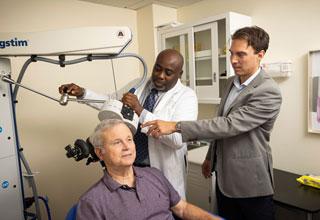Depression and Dementia: Protecting Your Cognitive Health
Learn how persistent depression in older adults is linked to dementia risk and why seeking care early can make a difference.

Depression later in life doesn’t just affect your mood — it may change how your brain ages. It can also impact your overall health, from exacerbating chronic conditions such as heart disease and diabetes to affecting physical function in ways that influence daily life.
Still, depression is not an inevitable part of aging — and it’s treatable!
Depression that appears for the first time in later life is frequently a symptom of changes in the brain associated with dementia. Early identification is crucial for enabling the early diagnosis and treatment of the underlying disease process.
Now, new studies have shown that when depression persists, it can accelerate memory loss and speed up the rate at which people progress to dementia. By understanding how depression can affect the brain, you can explore care options earlier to get the treatment you need.
What does persistent depression look like?
Depression can significantly affect the quality of life of older adults. It can impact how you feel, think, and act. Symptoms can range from mild to severe and cause feelings of sadness, a loss of interest in activities you once enjoyed, or even thoughts of suicide.
Untreated depression can affect people of all ages, but in later life, it may more often be linked to changes in energy, appetite, sleep, and cognitive focus — all of which can impact daily functioning and quality of life. You can read more about the symptoms of depression in older adults in our previous blog post.
Persistent depression is a long-lasting form of depression. While some people experience severe symptoms, most people with depression are able to continue with their daily routines. Since depression is present for a long time and symptoms often come on slowly, many people do not even realize that they are suffering from depression.
Persistent depression is diagnosed the same way as an episode of major depression.
The primary symptoms of depression are:
- Sad, low, or irritable mood, which is present most of the time
- Loss of interest in or giving up activities, especially those that were pleasurable
However, depression in older adults often manifests differently than it does in younger people. Older people are more likely to present with:
- Reduced appetite and weight loss
- Decreased activity levels and getting tired easily
- Reduced or interrupted sleep, or waking up feeling unrefreshed
- Reports of pain and other physical symptoms
- Feeling extremely worried about having a medical illness (hypochondria)
Persistent depression speeds up dementia risk
Understanding depression symptoms is only part of the puzzle. Two recent studies have shown that when depression lingers, it doesn’t just affect mood and daily functioning — it can accelerate cognitive decline and increase the likelihood of developing dementia.
One population-based study followed participants 65 years and older over an eight-year period, with assessments in 2003, 2007, and 2011. Researchers grouped participants into one of five depression trajectories over time: no depression, mild symptoms, improving symptoms, worsening symptoms, and persistently high symptoms.
Cognitive decline was present in all five groups, but was far more pronounced in the group with persistent depression. Older adults with persistent depression were two to three times more likely to experience poor cognition compared to those with no depression. Additionally, the steepest and most rapid cognitive decline occurred in the persistent depression group. Other groups, such as those whose depression improved, did not show significantly different rates of decline from people who were never depressed.
The second and even more impactful study analyzed data from the Alzheimer’s Disease Neuroimaging Initiative and followed older adults with mild cognitive impairment, which is an early and potentially reversible stage of cognitive decline. Researchers tracked the progression of participants’ mild cognitive decline. They also assessed participants for depression and divided them into three groups: low, moderate, or persistently high depression.
Those with persistently high depression progressed to the diagnosis of Alzheimer’s disease at the fastest rate. What makes these findings significant is that researchers weren’t just looking at memory decline: they were tracking the transition from mild cognitive impairment to Alzheimer’s disease.
That’s a critical difference, as it shows that persistent depression acts as an independent risk factor for developing dementia. The good news is that even persistent depression is treatable, meaning addressing it may help reduce the risk of dementia.
How depression shapes the brain
The link between depression and dementia makes sense when we look at what depression does to the brain’s structure and function. Depression has been found to shrink different parts of the brain, including the hippocampus, which is crucial for forming memories.
Another landmark study compared brain MRI scans of people taken during a depressive episode with scans repeated two years later. Those who were still depressed had shrinkage in their dorsolateral prefrontal cortex, a part of the brain closely related to depression. Participants whose depression had improved did not have a decrease in brain volume! Instead, they showed an increase in the thickness of the gray matter in their prefrontal cortex.
These changes often accompany the accumulation of the abnormal proteins tau and amyloid in the brain, which are involved in the development of Alzheimer’s disease.
The relationship between depression and abnormal tau and amyloid deposits is less clear, although there is some consistent evidence that depression in the early stages of cognitive impairment, like mild cognitive impairment, is associated with faster deposition of tau protein. This might set into motion a cascade of events that could eventually lead to the development of Alzheimer’s disease.
Depression is not an inevitable part of growing older
While everyone experiences emotional ups and downs throughout life, persistent depression is a serious medical condition that deserves attention and care at any age. Recognizing it as a treatable medical condition opens up the door to improved health and well-being.
The encouraging news is that there are multiple treatment options for depression. Antidepressant medications, especially paired with talk therapy, are often the first step and can be effective for many people. However, the reality is that only about 50-60% of people will respond to these treatment options.
For those who do not fully respond, advanced treatment such as transcranial magnetic stimulation or other forms of non-invasive brain electrical stimulation may provide relief. The Deanna and Sidney Wolk Center for Memory Health offers New England’s only TMS program for older adults with depression.
Lifestyle changes can also make a noteworthy difference. Finding the motivation to make changes can feel overwhelming when you’re experiencing depression, so speaking with a therapist about realistic, small steps can be a helpful way to get started. Seeking social connection, engaging in enjoyable activities, and regular exercise have all been shown to improve mood and support brain health. For more ideas on keeping your brain healthy, read our blog post on the power of lifelong learning.
TMS therapy for older adults in Greater Boston
Transcranial magnetic stimulation has shown great promise in improving treatment-resistant depression. At the Wolk Center for Memory Health, we’re proud to offer New England’s only TMS program designed specifically for older adults.
Learn how one of our patients found relief from lifelong depression through TMS treatment. Our team can coordinate with your psychiatrist or primary care physician to ensure you get the support you need.
If you think TMS may be right for you or a loved one, contact us online or call 617-363-8600.
Blog Topics
Learn More
TMS Treatment for Geriatric Depression
If you've tried to treat your depression using medications and are still experiencing symptoms, Transcranial Magnetic Stimulation might be right for you. Learn more about this non-invasive treatment offered at the Wolk Center for Memory Health.




